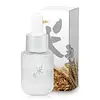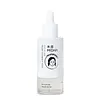What's inside
What's inside
 Key Ingredients
Key Ingredients

 Benefits
Benefits

 Concerns
Concerns

 Ingredients Side-by-side
Ingredients Side-by-side

Oryza Sativa Bran Water
MaskingGlycerin
HumectantButylene Glycol
HumectantPropanediol
Solvent1,2-Hexanediol
Skin ConditioningNiacinamide
SmoothingOryza Sativa Extract
AbsorbentEmbryo Extract
MoisturisingHeptasodium Hexacarboxymethyl Dipeptide-12
Skin ConditioningRice Sh-Oligopeptide-1
Skin ConditioningCuminum Cyminum Seed Extract
MaskingSh-Barley Seed Extract
Skin ConditioningGlycine Soja Seed Extract
Skin ConditioningSaccharum Officinarum Extract
MoisturisingRheum Officinale Stem Extract
Skin ConditioningCarya Ovata Bark Extract
Skin ConditioningOlivine Extract
Skin ConditioningPisum Sativum Extract
Skin ConditioningCoccinia Indica Fruit Extract
Skin ConditioningAzadirachta Indica Leaf Extract
Skin ConditioningBetaine
HumectantAllantoin
Skin ConditioningCeramide NP
Skin ConditioningCeramide Ns
Skin ConditioningCeramide AP
Skin ConditioningCeramide As
Skin ConditioningCeramide EOP
Skin ConditioningPhytosphingosine
Skin ConditioningCholesterol
EmollientAdenosine
Skin ConditioningDipotassium Glycyrrhizate
HumectantWater
Skin ConditioningSodium Polyacrylate
AbsorbentDisodium EDTA
Ethylhexylglycerin
Skin ConditioningCetearyl Alcohol
EmollientStearic Acid
CleansingHydrogenated Lecithin
EmulsifyingAcrylates/C10-30 Alkyl Acrylate Crosspolymer
Emulsion StabilisingArginine
MaskingOryza Sativa Bran Water, Glycerin, Butylene Glycol, Propanediol, 1,2-Hexanediol, Niacinamide, Oryza Sativa Extract, Embryo Extract, Heptasodium Hexacarboxymethyl Dipeptide-12, Rice Sh-Oligopeptide-1, Cuminum Cyminum Seed Extract, Sh-Barley Seed Extract, Glycine Soja Seed Extract, Saccharum Officinarum Extract, Rheum Officinale Stem Extract, Carya Ovata Bark Extract, Olivine Extract, Pisum Sativum Extract, Coccinia Indica Fruit Extract, Azadirachta Indica Leaf Extract, Betaine, Allantoin, Ceramide NP, Ceramide Ns, Ceramide AP, Ceramide As, Ceramide EOP, Phytosphingosine, Cholesterol, Adenosine, Dipotassium Glycyrrhizate, Water, Sodium Polyacrylate, Disodium EDTA, Ethylhexylglycerin, Cetearyl Alcohol, Stearic Acid, Hydrogenated Lecithin, Acrylates/C10-30 Alkyl Acrylate Crosspolymer, Arginine
 Reviews
Reviews

Ingredients Explained
These ingredients are found in both products.
Ingredients higher up in an ingredient list are typically present in a larger amount.
Disodium EDTA plays a role in making products more stable by aiding other preservatives.
It is a chelating agent, meaning it neutralizes metal ions that may be found in a product.
Disodium EDTA is a salt of edetic acid and is found to be safe in cosmetic ingredients.
Learn more about Disodium EDTAGlycerin is already naturally found in your skin. It helps moisturize and protect your skin.
A study from 2016 found glycerin to be more effective as a humectant than AHAs and hyaluronic acid.
As a humectant, it helps the skin stay hydrated by pulling moisture to your skin. The low molecular weight of glycerin allows it to pull moisture into the deeper layers of your skin.
Hydrated skin improves your skin barrier; Your skin barrier helps protect against irritants and bacteria.
Glycerin has also been found to have antimicrobial and antiviral properties. Due to these properties, glycerin is often used in wound and burn treatments.
In cosmetics, glycerin is usually derived from plants such as soybean or palm. However, it can also be sourced from animals, such as tallow or animal fat.
This ingredient is organic, colorless, odorless, and non-toxic.
Glycerin is the name for this ingredient in American English. British English uses Glycerol/Glycerine.
Learn more about GlycerinNiacinamide is a multitasking form of vitamin B3 that strengthens the skin barrier, reduces pores and dark spots, regulates oil, and improves signs of aging.
And the best part? It's gentle and well-tolerated by most skin types, including sensitive and reactive skin.
You might have heard of "niacin flush", or the reddening of skin that causes itchiness. Niacinamide has not been found to cause this.
In very rare cases, some individuals may not be able to tolerate niacinamide at all or experience an allergic reaction to it.
If you are experiencing flaking, irritation, and dryness with this ingredient, be sure to double check all your products as this ingredient can be found in all categories of skincare.
When incorporating niacinamide into your routine, look out for concentration amounts. Typically, 5% niacinamide provides benefits such as fading dark spots. However, if you have sensitive skin, it is better to begin with a smaller concentration.
When you apply niacinamide to your skin, your body converts it into nicotinamide adenine dinucleotide (NAD). NAD is an essential coenzyme that is already found in your cells as "fuel" and powers countless biological processes.
In your skin, NAD helps repair cell damage, produce new healthy cells, support collagen production, strengthen the skin barrier, and fight environmental stressors (like UV and pollution).
Our natural NAD levels start to decline with age, leading to slower skin repair, visible aging, and a weaker skin barrier. By providing your skin niacinamide, you're recharging your skin's NAD levels. This leads to stronger, healthier, and younger looking skin.
Another name for vitamin B3 is nicotinamide. This vitamin is water-soluble and our bodies don't store it. We obtain Vitamin B3 from either food or skincare. Meat, fish, wheat, yeast, and leafy greens contain vitamin B3.
The type of niacinamide used in skincare is synthetically created.
Learn more about NiacinamideOryza Sativa Extract comes from the rice grain, Oryza sativa. Rice extract has wound healing, antioxidant, anti-inflammatory, and hydrating properties.
Rice grains contain numerous antioxidants which may help with anti-aging, such as vitamin E. Antioxidants help stabilize free-radical molecules. Unstable free-radical molecules may damage your skin cells and accelerate signs of aging.
A study from 2002 found rice to help increase the rate of wound healing. The same study found an improvement of skin barrier function in the patients after taking rice baths.
Numerous in-vitro studies have found rice water to help decrease sun damage by increasing collagen production and inhibiting the process of tyrosinase.
Long story short- tyrosinase is an enzyme that controls melanin production. Our bodies start producing melanin (AKA tanning) when exposed to UV radiation to protect against damage. Rice water is found to partially block this process.
Though more research is needed on rice's ability to help with UV protection, recent studies seem promising.
Wondering why rice is hydrating? The protein in rice have emollient properties. Emollients create a barrier on the skin to trap moisture in, keeping your skin moisturized.
Some rice extract may have mildly-exfoliating properties. These are mainly limited to Oryza Sativa (Rice) Bran and Oryza Sativa (Rice) Germ Powder.
This rice was first cultivated in China over 10,000 years ago. Many cultures throughout Asia have used rice water on skin and hair for centuries.
Learn more about Oryza Sativa ExtractWater. It's the most common cosmetic ingredient of all. You'll usually see it at the top of ingredient lists, meaning that it makes up the largest part of the product.
So why is it so popular? Water most often acts as a solvent - this means that it helps dissolve other ingredients into the formulation.
You'll also recognize water as that liquid we all need to stay alive. If you see this, drink a glass of water. Stay hydrated!
Learn more about Water